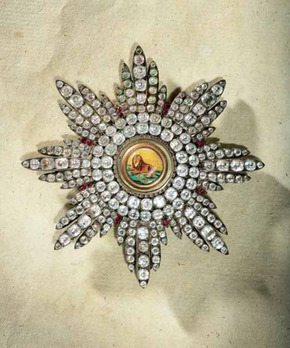Order of the Lion and Sun, Type II, II Class Breast Star
SKU: 01.IRN.0102.202.01
Estimated market value:

Estimated market value:
Attributes
History
The Order of the Lion and Sun was originally instituted by Fath-Ali Shah Qajar, the second Qajar emperor of Iran, in 1808. The Order was conferred upon senior government officers and foreigners in recognition of admirable and distinguished service provided to the State. In 1939, Reza Shah Pahlavi replaced the Order with the Order of Homayoun (Order of August).
Since its institution, the Order has undergone numerous organizational changes. The Type II Order was instituted under the reign of Mohammed Shah between 1834 and 1848. The Type II Order was conferred in 8 Classes according to military rank, from 4-star generals to non-commissioned Officers. However, due to the complexity of the award and changes over time, the regulations of award, class, and degree criteria of the Order is uncertain.
The II Class Breast Star was issued in 3 Degrees as the second highest class under the Type II Order to the rank of major general or above. It is uncertain if the II Class was awarded with a Breast Star and a Ribbon Badge. More research is necessary.
The 1st Degree II Class Breast Star features 8 pointed rays and 3 diamond bands surrounding the centre medallion disk.
There are multiple versions of the II Class Breast Star which vary by design and composition. The Order is known to feature 2 distinct badge pendant designs. The centre medallion of the Order's badge depicts either a statant (standing) lion holding a sword or a resting (couchant) lion. Various sources posit that the statant lion was issued to recipients in recognition of military service, while couchant lions were awarded to denote civil service. However, other sources believe that the statant lion was awarded to Persian nationals and the couchant lion was awarded to foreigners. More research is necessary.
There is also great variation across designs of both the statant and couchant lion. This is due to multiple European, Russian, and Iranian manufacturers of the Order; who abide by different production regulations and procedures. Additionally, the centre medallion of the badge pendant was often hand painted, making examples of the Order highly variant and unique.
There is limited information regarding this item.


Comments
Sign in to comment and reply.


Scroll Top